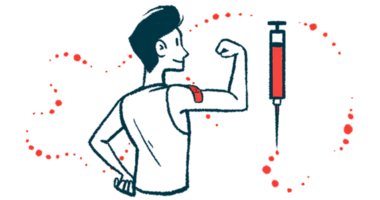Interferon Beta-1b Effective, Safe for Older MS Patients: Real-world Study

A real-world study confirmed the effectiveness and safety of interferon beta-1b in treating older adults with multiple sclerosis (MS), those over the age of 40.
“These findings from a real-world setting are promising and demonstrate the positive benefit-risk ratio for [interferon beta-1b] in this study population of middle-aged and older MS patients,” the researchers wrote.
The study, “Clinical characteristics of middle-aged and older patients with MS treated with interferon beta-1b: post-hoc analysis of a 2-year, prospective, international, observational study,” was published in the journal BMC Neurology.
Interferon beta-1b, sold in the U.S. as Betaseron (and in Europe as Betaferon) and as Extavia, is a disease-modifying therapy (DMT) that suppresses inflammation related to the loss of the myelin sheath, a fatty coating surrounding nerve fibers, typical in MS. The treatment reduces MS symptoms and the number of patients’ exacerbations.
Studies suggest the average age of people with MS has increased significantly in the past two decades, primarily due to improved survival rates. However, older patients are excluded from many clinical trials, in part because of a higher likelihood of co-existing medical conditions. As such, few studies have investigated their response to DMTs like interferon beta-1b.
Researchers at the University of Catania in Italy, in collaboration with Bayer, the study’s sponsor and company marketing Betaseron/Betaferon, analyzed data on older patients who participated in the BEACON trial (NCT00787657). This two-year international study investigated whether nursing support and MS-related factors affected the long-term adherence to interferon beta-1b treatment in 1,723 people, ages 12 and older, recently diagnosed with MS or clinically isolated syndrome (CIS).
“The sub-analysis allows us to focus in a real-world data scenario on this less-studied patient population with MS,” the team wrote.
Eligible BEACON participants had started treatment with interferon beta-1b within six months before study entry. Of these, efficacy data were available for 508 patients ages 41 to 72 years. About 95% had relapsing-remitting MS (RRMS), and the remaining had secondary progressive MS (SPMS).
For their analysis, researchers divided these participants into two age groups: from 41 to 50 years old, which included 343 people, and those older than 50, totaling 165 participants. For 113, MS symptoms began after age 50.
In RRMS patients, the results revealed that the mean annualized relapse rate (ARR) in the two years before the study was 0.93 for the 41–50 age group, decreasing to 0.20 during the study period. In the older than 50 group, the ARR was 0.86 before treatment and 0.07 after.
The proportion of 41- to 50-year-old RRMS patients without relapse was 90.4% during the study, compared with 6.2% before interferon beta-1b use. For the older group, 94.2% reported no relapses with treatment versus 10.2 % in the two years before.
Based on the expanded disability status scale (EDSS), a measure of disease severity, 11% in the 41–50 age group reported lessened disability after treatment, 72.8% had no change, and 16.3% worsened. In patients older than 50, 8.9% had improved symptoms, 66.7% showed no change, and 24.4% reported worse disability.
Both relapse-free and progression-free disease were seen in 75.7% of the 41–50 group, and 71.1% of the older than 50 group.
Assessments of anxiety and depression, as determined by the Hospital Anxiety and Depression Scale (HADS), showed similar outcomes in both older age groups over the study’s two years. In the 41–50 age group, anxiety scores dropped (less anxiety) from a mean of 8.6 before treatment to 8.0 after, while depression scores decreased (less depression) from a mean of 6.6 to 6.4.
For those older than 50, mean anxiety scores were reduced from 8.5 to 7.5 following two years of interferon beta-1b treatment, and mean depression scores lowered from 7.1 to 7.0.
An additional safety assessment undertaken in 492 BEACON participants, including 334 people from 41–50 age group and 158 among those older than 50. Overall, 246 of the 492 (50%) took one or more medications other than interferon beta-1b, which corresponded to 48.2% in the 41–50 year group and 53.8% in the older than 50 group.
Four or more additional medications were given to 32.3% of those between 41 and 50, and 41.2% of patients older than 50. Based on these prescribed therapies, co-existing conditions relevant to older MS patients included cardiovascular disease and related disorders, infections, cancers, and other autoimmune diseases.
Treatments for depressive or anxiety disorders were being given to 45 patients in the 41–50 group, and 25 in the older than 50 group.
In terms of safety, the number of participants with any adverse event (AE) was 50 (15%) in the 41–50 group, with the most common being reported as influenza-like illness, followed by headache and depression. In those older than 50, 31 (19.6%) experienced an AE, with an injection-site reaction being the most common AE, followed by headache and depression.
Regarding serious adverse events (SAEs), 14 (4.2 %) were found in those between 41 and 50. Of these, four were attributed to interferon beta-1b, each with congestive cardiomyopathy (impaired heart function), acute pancreatitis (pancreas inflammation), liver toxicity, and depression. None of the two (1.3%) SEAs in patients older than 50 were associated with the medication. Five deaths occurred during the study, but none were determined to be caused by interferon beta-1b.
“Given the outcomes for MS patients aged 41–50 or those older than 50 years in this real-world evidence current study, it seems that these patients benefitted from ongoing use of [interferon beta-1b] during this 2-year observational period, with no evidence of particular increases in safety risks with greater age,” the researchers wrote.
“However, randomised controlled trials are needed to better inform treatment decisions in this understudied age group,” they added.







